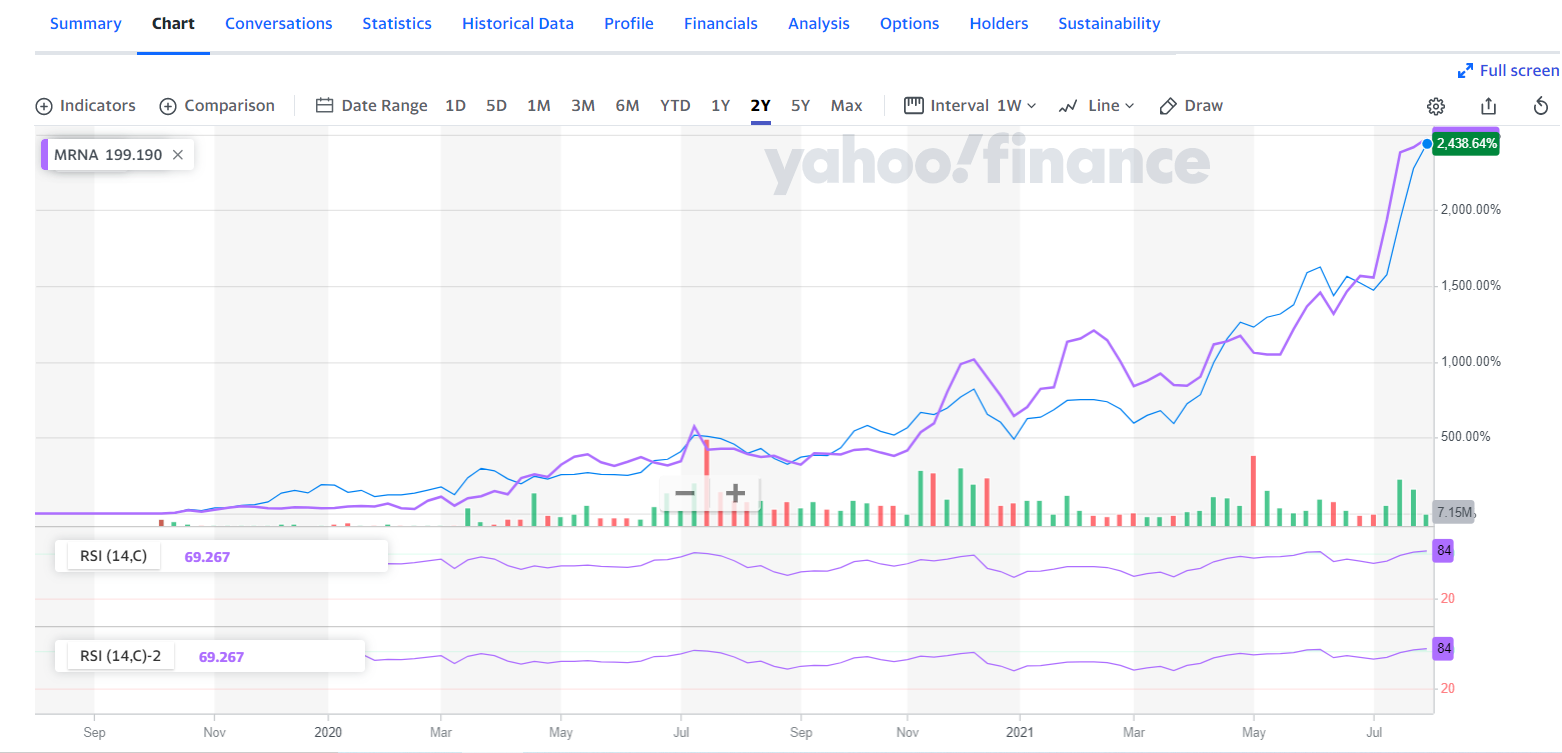Moderna, Inc. MRNA and BioNTech SE BNTX shares have been on tear ever since these companies embarked on their respective COVID-19 vaccine programs.
Shares of both companies are trading just shy of their all-time highs.
How Moderna, BioNTech Compare On COVID-19: Moderna, which started out as a tiny biotech based out of Cambridge, Massachusetts, bet on a technology called messenger RNA.
The mRNA transfers the instructions stored in DNA to make the proteins required for a living cell. The company uses mRNA medicines to instruct a patient's own cells to produce proteins that can potentially prevent, treat or cure diseases.
The company began developing a vaccine, codenamed mRNA-1273, against the novel coronavirus at the start of 2020, and the Phase 1 testing was done along with the NIH.
Within a year of initiating the program, the company secured authorization for emergency use in the U.S. in adults 18 and older. Moderna's vaccine has an efficacy rate of 94.1%.
Armed with the strong trial results, the company went about stitching supply deals with several governments.
When the threat of variants emerged, the company began testing booster vaccine candidates and a next-gen vaccine codenamed mRNA-1283. The company has also obtained authorization for expanding the label of mRNA-1273 to include adolescents ages 12-17.
Moderna has filed for full approval of the vaccine in the U.S.
BioNTech, a German biotech, rose to fame with the partnership it forged with U.S. pharma giant Pfizer, Inc. PFE in 2020 for developing a mRNA vaccine against the novel coronavirus.
The company was founded by a husband-wife team of Dr. Ugur Sahin and Dr. Özlem Türeci in 2008, and it initially focused on cancer treatments.
BioNTech shortlisted BNT162b2 after testing a few strains developed under its Project Lightspeed. The development trajectory was similar to Moderna's. Helped by Pfizer's financial might and resources, BioNTech quickly brought its vaccine program to fruition.
BioNTech and partner Pfizer were the winners of the race for a COVID-19 vaccine, receiving the FDA's emergency use authorization on Dec. 11.
Related Link: How Much A $1,000 Investment In Moderna Stock At the Time Of COVID-19 Vaccine Authorization Would Be Worth Today
COVID-19 Vaccine Revenue: Moderna's mRNA-1273 vaccine fetched revenues of $199.87 million for the company in the fourth quarter. Revenues from the vaccine ballooned to $1.7 billion in the March quarter.
In early May, Moderna said in its first-quarter release that it has signed advance purchase agreements for scheduled delivery in 2021 for a total of $19.2 billion.
BioNTech's vaccine generated revenues of about $2 billion in the first quarter, including its share of profits from the sale of the vaccine in Pfizer's territory, sales to collaboration partners and direct sales of vaccine to customers in its territories.
Click here to access Benzinga's FDA Calendar.
Moderna, BioNTech's Product Pipelines: Moderna's pipeline consists of 24 mRNA development programs, with 14 of those in clinical development.
The core modalities include prophylactic vaccines, systemic secreted and cell surface therapeutics, cancer vaccines, intratumoral immune-oncology candidates, localized regenerative therapeutics and systemic intracellular therapeutics.
Moderna's Phase 2 assets include a cytomegalovirus vaccine, codenamed mRNA-1647, a personalized vaccine candidate, codenamed mRNA-4157, an immune-oncology asset codenamed RNA-2416 for solid tumors, lymphoma and advanced ovarian cancer and an out-licensed asset named AZD8601 for myocardial ischemia.
On Tuesday, Moderna said it has received fast track designation for its respiratory syncytial virus vaccine mRNA-1345, which is in Phase 1 development.
BioNTech has 27 pipeline candidates in varied stages of development for different indications. The company's assets in clinical development number 13.
The most advanced candidate in its pipeline is a Phase 2 asset named RO7198457, which it has out-licensed to Roche Holding AG's RHHBY Genentech unit. It is being developed as a first-line treatment for melanoma with checkpoint inhibitor.
Apart from mRNA technology, the company is also developing cell therapy and antibody treatments, infectious disease immunotherapies and rare disease protein replacement therapies.
Moderna Vs. BioNTech Stock: The shares of Moderna and BioNTech have traced an almost identical trajectory, reflecting their successes in their respective COVID-19 vaccine programs.

Moderna listed its shares on the Nasdaq in December 2018 following an initial public offering of 26.28 million shares at an IPO price of $23 per share.
BioNTech went public almost a year later. The shares of the German biotech began trading on the Nasdaq in October 2019. The company offered 10 million shares in the IPO for $15 per share.
Moderna gained 471% in 2020 compared to a 140% gain for BioNTech. For the year-to-date period, shares of Moderna and BioNTech are up 232% and 317%, respectively.
Related Link: This COVID-19 Vaccine Stock Quietly Soared 75% In April: Is There More Upside Ahead?
© 2025 Benzinga.com. Benzinga does not provide investment advice. All rights reserved.
Trade confidently with insights and alerts from analyst ratings, free reports and breaking news that affects the stocks you care about.